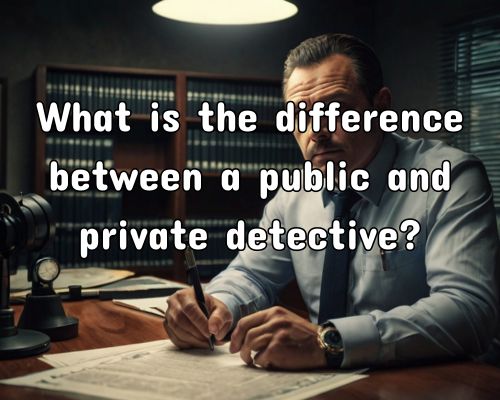Determining the differences between public and private detectives involves understanding their roles, duties, and the contexts in which they operate.

Based on Charles Jimerson from Private Investigator West Palm Beach “Public detectives are trained professionals employed by government agencies or law enforcement departments. They focus on enforcing laws and maintaining public order.”
Their work often involves solving crimes, gathering evidence, interviewing witnesses, and sometimes making arrests. They possess legal authority and extensive resources, allowing them to handle complex investigations that require official sanctions and comprehensive legal procedures.
On the other hand, private detectives work independently or for private agencies. They cater to individual clients or businesses, providing services such as background checks, surveillance, and information gathering.
Unlike public detectives, private detectives do not have the authority to make arrests and must operate within the constraints of the law.
This fundamental difference in authority and focus sets public detectives apart from their private counterparts.
It highlights the diverse approaches each takes in fulfilling their investigative responsibilities.
You might find that the key factor distinguishing these two types of detectives is their operational scope.
While public detectives concentrate on criminal investigations with a broad societal impact, private detectives hone in on private matters affecting personal or corporate interests.
This delineation shapes the nature of their duties and the methodologies they employ.
Balancing legality, ethical considerations, and client needs, private detectives navigate a different professional landscape than their public counterparts.
Roles and Responsibilities
Public and private detectives both play crucial roles in investigative work, yet their responsibilities, jurisdictions, and legal authorities are distinct. This section delves into the specific nuances that differentiate their roles.
Jurisdiction and Legal Authority
Public detectives, often called police detectives, operate under the authority of government agencies. They have the power to make arrests, execute search warrants, and access state-controlled databases.
These detectives work within predefined legal jurisdictions, typically within a city, county, or state. Their actions are closely governed by legal protocols and regulatory frameworks.
In contrast, private detectives do not possess the same legal authority. They cannot make arrests or obtain search warrants.
Instead, they rely on their investigative skills to gather information within the boundaries of the law.
Their jurisdiction is not restricted by geographical limits as strictly as public detectives; however, they must still adhere to legal constraints in their investigative practices.
Scope of Investigative Work
Public detectives primarily focus on criminal activities. They handle a variety of cases including fraud, homicide, and other serious crimes.
Their investigative work often leads to criminal charges and prosecutions. These professionals collect evidence, conduct interviews, and collaborate with prosecutors to build cases that support legal proceedings. Their responsibilities also include writing detailed reports that are essential for the prosecution of criminal cases.
Private detectives, on the other hand, offer a wide range of investigative services that may or may not involve criminal activities.
They handle cases such as infidelity investigations, asset searches, and background checks.
They are often hired by individuals, businesses, and legal firms.
Their work is mostly centered around providing accurate information for their clients rather than pursuing criminal charges. Private detectives spend significant time on surveillance and interviews to gather data for their clients.
Crime and Legal Process Involvement
Public detectives are deeply involved in the criminal justice process. They work closely with law enforcement agencies and prosecutors throughout investigations.
Their goal is to collect sufficient evidence to support arrests and secure convictions in court. They must follow stringent protocols to ensure that the evidence they gather is admissible in legal proceedings.
This often includes obtaining and executing search warrants and testifying in court.
Private detectives’ involvement with the criminal justice system is more limited.
Although they may assist in criminal defense investigations, their primary role is to support their client’s specific needs.
They may gather evidence that can be used in court, but they do not have the authority to make legal determinations.
Their work can complement that of public detectives by providing additional insights or uncovering hidden information.
Professional Requirements and Skills
Public and private detectives, while sharing some common skills, have distinct differences in their professional requirements, legal obligations, and expertise related to their respective fields. Let us get to know these with Charles Jimerson from Private Investigator West Palm Beach.
Education and Training
Public detectives, often referred to as police detectives, typically start their careers as uniformed officers.
They need to complete high school, graduate from a police training academy, and gain on-the-job experience. Some may also pursue an associate’s or bachelor’s degree in criminal justice or related fields to advance their careers.
Private investigators (PIs) generally require a license, which varies by state.
Licensing often involves having a combination of education, like a degree in criminal justice, and several years of relevant investigative experience.
On-the-job training is crucial for PIs as they may work in diverse fields requiring specialized knowledge and skills.
Legal and Ethical Obligations
Public detectives operate under strict government regulations and oversight. They must adhere to protocols set by law enforcement agencies and have the authority to enforce laws, make arrests, and conduct official investigations.
Private detectives, on the other hand, must follow state-specific laws and regulations.
Their work is typically client-driven, and they are bound by confidentiality agreements.
They cannot make arrests or carry out actions reserved for law enforcement but must ensure their methods are legally compliant to avoid legal disputes and maintain credibility.
Skill Sets and Expertise
Public detectives need strong analytical skills, an aptitude for crisis management, and the ability to work under pressure. They excel in skills like interviewing, surveillance, and gathering evidence to solve crimes. They must also be adept in legal documentation and court proceedings.
Private investigators must have keen decision-making skills and be tenacious in their investigations. They should be proficient in various investigative techniques. These include background checks, surveillance, and fraud investigation. PIs often act as consultants, requiring excellent communication and report-writing skills to present findings to clients effectively.